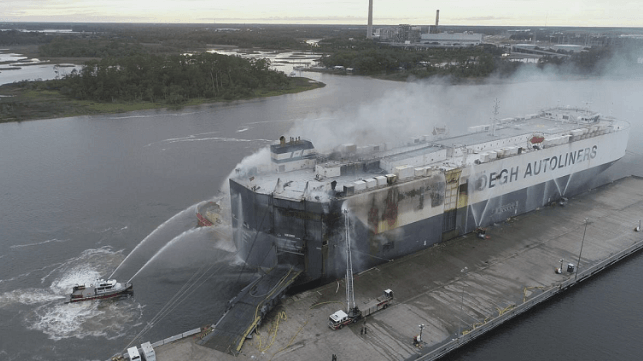Failure to Disconnect Car Batteries Caused Inferno Aboard Höegh Xiamen

An electrical fault from an improperly disconnected battery in a used vehicle led to the fire aboard vehicle carrier Höegh Xiamen, resulting in $40 million worth of damages, the U.S. National Transportation Safety Board (NTSB) concluded in a newly-released investigative report.
NTSB determined that failure to properly disconnect and secure vehicle batteries ignited the fire on the 600-foot-long Norwegian-flagged roll-on/roll-off vehicle carrier. The vessel caught fire as she was preparing to depart the Blount Island Horizon Terminal in Jacksonville, Florida, en route to Baltimore, Maryland on June 4, 2020.
A bystander on the pier noticed smoke coming from the vessel's ventilation exhaust vents while the ship was preparing to depart. The crewmembers discovered a fire on deck 8, which had been loaded with used vehicles. The fire eventually spread to other decks and continued to burn for eight days, leading to total destruction of the ship.
The Jacksonville Fire and Rescue Department responded to help fight the fire, and a few hours later, nine firefighters sustained injuries in an explosion on board. None of the vessel’s 21 crewmembers were injured.
The fire took over a week to extinguish, and the Höegh Xiamen and her cargo of 2,420 used vehicles were declared a total loss at a cost of $40 million. In August 2020, after salvage operations were completed, the vessel was towed to Turkey to be recycled.
“Many of the vehicles loaded onto the vessel had batteries that were not disconnected and secured in accordance with procedures, which increased the risk of electrical arcing and component faults. During loading operations, both the loading personnel and crew missed opportunities to address these hazards,” said NTSB in its report.
NTSB added that detection of the fire was delayed because the vessels’ fire detection systems had not yet been reactivated after loading was completed. Also contributing to the extent of the fire was the master’s decision to delay the release of the vessel's fixed firefighting system.
The response to the accident was further delayed because the ship’s master did not immediately have available contact information for search and rescue authorities, and he did not know how to report a fire to local authorities, NTSB found.
NTSB determined that the crew failed to adhere to the Hazardous Materials Regulations developed following a similar incident involving the Grimaldi’s Grande Europa in 2019.
Following Grimaldi’s experience with previous roll-on/roll-off vessel fires, the company developed a battery disconnect procedure to reduce the risk of vehicle fires during transportation. At the time of the fire, Höegh Xiamen was on charter to Grimaldi for the transport of "non-commercial used personal vehicles in poor condition," including some that were so damaged that they had to be carried aboard with a forklift.

that matters most
Get the latest maritime news delivered to your inbox daily.
Although Höegh Xiamen and the longshore crew were supposed to use Grimaldi's battery-disconnect procedure, a postaccident examination of a sample of 59 vehicles did not find a single battery that was secured.
“We determined that the probable cause of the fire aboard the vehicle carrier Höegh Xiamen was ineffective oversight of longshoremen, which did not identify that Grimaldi’s vehicle battery securement procedures were not being followed, resulting in an electrical fault from an improperly disconnected battery in a used vehicle on cargo deck 8,” said NTSB. “The circumstances of this accident make clear that it is critical to ensure that the batteries of used vehicles are disconnected and properly secured during cargo loading operations,” said NTSB.
